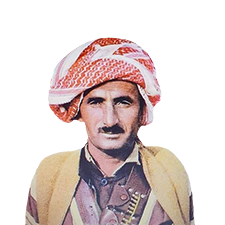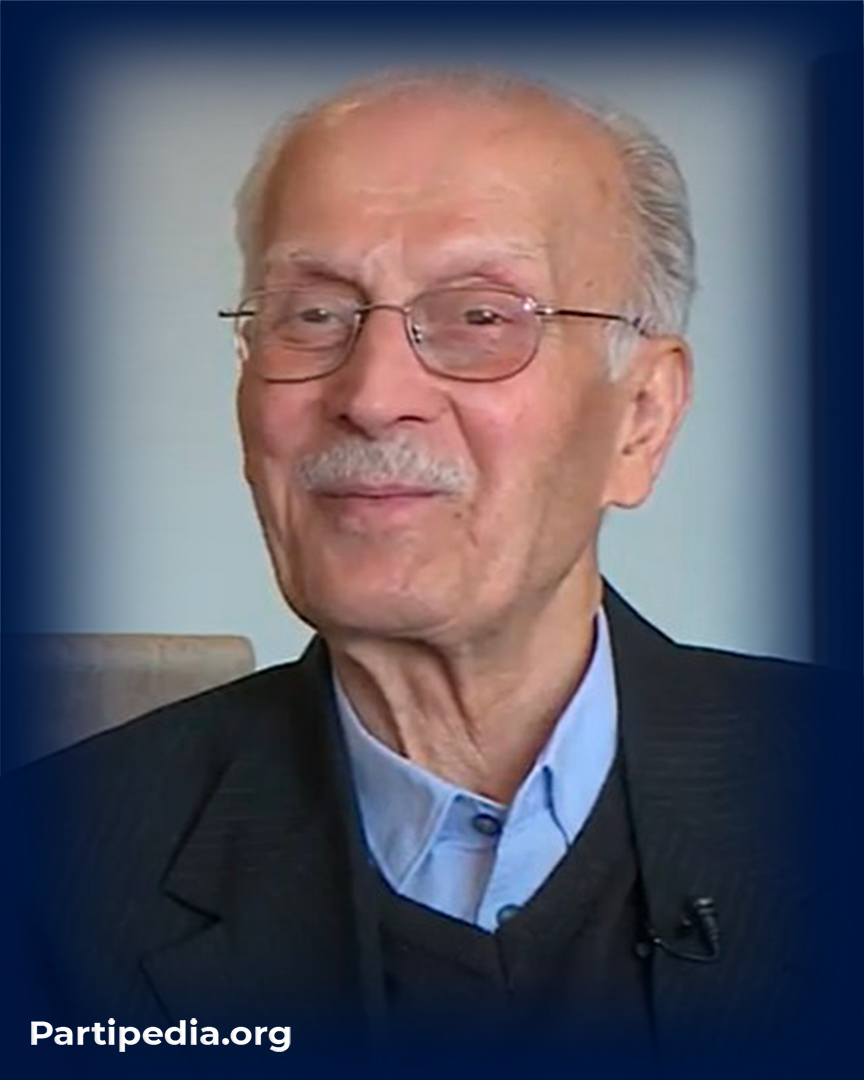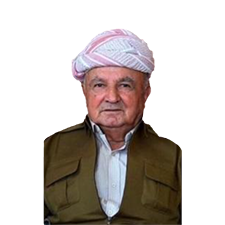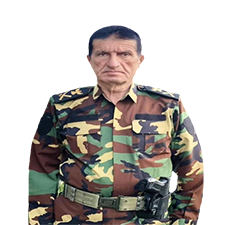Haji Shekhomar Berokhi was born in the winter of 1916 in Berokhi village of Sherwan Mazni district of Mergasuri town of Erbil province. He studied in a mosque.
In 1945, after the collapse of the Second Barzan Revolution, he was imprisoned by the Iraqi government for four years. After his release, he goes back to his hometown and settles there. In 1959, after the return of Mala Mustafa Barzani, he returned to South Kurdistan. Furthermore, in 1975, after the collapse of the Aylul Revolution, he fled to Iran and settled in Jaldiyan village of town Shino. After that, the Iranian authorities deported him to the city of Yazd. Subsequently, his family relocated to Yazd in July 1976, where they later reunited with him. Haji Shekhomar passed away in 1989.
In 1943, he joined the Peshmerga forces of the Second Barzan Revolution and became a commander. On October 20, 1943, when Mala Mustafa Barzani returned to Barzan from Sulaimani, under Barzani's command, the Revolutionary Forces carried out several activities. One of the activities is to build the castle of the village of Zet in the Gardiyan region. In this activity, Haji Berokhi succeeds. Furthermore, to destroy the Barzani revolutionary forces, the Iraqi army attacked Goratu from Rwandz on October 28, 1943. Haji Berokhi served as a commander during the defense. Moreover, on November 10, 1943, he participated in the Mazne Battle. On August 28, 1945, he participated in the Badlian-Kawnagund Battle. On September 5, 1945, he participated in the Maidan Morik Battle. He was gravely wounded in the Maidan Morik Battle.
In 1945, after the collapse of the Second Barzan Revolution, Haji Berokhi was unable to go with Mala Mustafa Barzani to East Kurdistan because of his serious injuries. He was arrested by the Iraqi government and handed over to the Turkish government after four years in prison. Then, Haji Berokhi visited Mala Mustafa Barzani in 1959 following his return from the Soviet Union. This marks the start of Hajj Berokhi and Mala Mustafa Barzani's reunion.
In 1961, Haji Berokhi and several members of his tribe joined the Peshmerga forces of the Aylul Revolution. On September 16, 1961, he participated in the Battle of Mount Pirs in Akre against the army's attack on the areas of the revolutionary forces. In the same year, he participated in the Lomana Battle in Badinan. In 1962, he participated in the battles in Ba'adre and Atrush.
On May 28, 1962, he returned to Rwandz and Balakayety with Mala Mustafa Barzani. On April 4, 1962, he and several other Peshmerga commanders surrounded Rayati Castle in Haji Omeran. Then, in August 1962, after arriving in Khoshnawti area with Mala Mustafa Barzani, he participated in the liberation of Hiran and Nazanin castles. He also maintained offices in both locations. In addition, he oversaw the Peshmerga forces' liberation of Sidekan's Khawkurk region on September 25, 1962.
On February 4, 1963, he accompanied Mala Mustafa Barzani to Ranya and Qaladze regions to beat the traitors. On June 29, 1963, he participated in the Battle of Darbandi Korey as a commander. Also, on July 13, 1963, he participated in the Battle of Spilki near Kalakin village. Additionally, on August 24, 1963, he participated in the Battle of Kurani and played a major role as a commander. Moreover, he fought back against a significant Iraqi army attack on Mount Piran in Kolanadere on August 30, 1963. Then, under Luqman Mustafa Barzani's leadership, they established a defensive line in Shiwe village on September 17, 1963. There were multiple conflicts involving the army and Peshmerga forces in that area.
In December 1964, he accompanied Mala Mustafa Barzani to Pishder and Ranya. From 1965 to 1970, Haji Berokhi played the role of a brave and wise commander in the Iraqi army's attacks on Zozk Mountain, Omar Agha Gorge, Sartiz and Besha Gorge.
On April 6, 1966, he commanded the Peshmerga forces to counter the Iraqi army's attack on Omar Agha Gorge. Moreover, in 1967, after the establishment of the Balak forces, he became the commander of the first battalion of the force. In addition, in 1968, the area from the Musaka River to the Omar Agha Gorge, Zozk Mountain, Besha Gorge, Sartiz Mountain and Hamilton Street was placed under the supervision of Haji Berokhi.
In 1974, after the resumption of the war between the Peshmerga forces and the Iraqi army, he was responsible for the bases of Mount Zozk, Diyana Plain, Omar Agha Gorge and Sartizi Mountain. He repelled most of the Iraqi army's attacks, and until 1975 his Peshmergas were there to prevent the Iraqi army from advancing.
In 1980, he joined the Peshmerga forces of the May Revolution. Also, He formed a force of 90 Peshmergas. To do activities in the Xane area, they went to Kawpar area and from there to Tuye valley. Moreover, they dealt several blows to the Iraqi army in Haji Omeran. They continued their fight for freedom until he became ill.
Sources:
kdp encyclopedia archive









